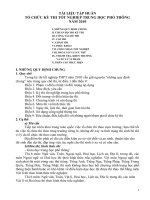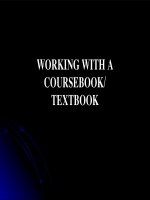Tài liệu tập huấn english bồi dưỡng
Bạn đang xem bản rút gọn của tài liệu. Xem và tải ngay bản đầy đủ của tài liệu tại đây (206.13 KB, 31 trang )
ENGLISH VOWELS
1./Ι/=/ Ι / - /ι/ =/Ι:/
Ι
is city still private pretty
ι
see seat field key machine
/Ι/
1. What is this?
2. I like to live in a big city.
3. Bill is still ill.
4. This is your private messages.
5. What a pretty girl!
/ι/
1. Can you see that sign?
2. There are many seats.
3. We went across a paddy field.
4. Oh my God! I have lost my key.
5. She wants a washing machine.
2. / ε/ =/ e/- /Θ/ =/ /
ε
pen any best friend ready
Θ
cat fat bad plait happy
/ε/
1. Can I borrow your pen?
1
2. I haven’t got any money.
3. You are the best.
4. Ted is my best friend.
5. Are you ready?
/Θ/
1. She has a big cat.
2. He is a big fat man.
3. It is a bad day.
4. The girl often plaits her hair.
5. Happy birthday to you!
3./ ℘/=/ / - /Α/=/ /
℘
come fun flood color Country
Α
calm clerk farm heart Market
/℘/
1. Come in.
2. Come and have fun.
3. The city was destroyed by flood.
4. What color do you like?
5. What country are you from?
/Α/
1. Calm down.
2. Her father is a clerk.
2
3. They live on a big farm.
4. She died of a heart attack.
5. Let’s go to the super-market now.
4./ /= / / - / /= / /
/ /
1. Hey, be careful with that dog!
2. What are you doing?
3. I couldn’t stop coughing.
4. He doesn’t go because of you.
5. Traveling broadens our knowledge.
/ /
1. All of us went there.
2. I want some more tea please.
3. He has written four books.
4. Look at the board, girls!
5. This is my daughter.
5./ Υ/= / u/ - /υ=/u:/
dog what cough because Knowledge
all more four board Daughter
3
/Υ/
1. The street is full of people.
2. I like reading books.
3. Could you hear me?
4. Are you going to the butcher’s?
5. She is just a girl, not yet a woman.
/υ/
1. See you soon in June.
2. What food does he like?
3. Work in groups of three please.
4. She has got big blue eyes.
5. Don’t move or I’ll shoot.
6./ ↔/ =/ / - /∈ =/ /
1. She is going to be a mother.
Υ
full book could butcher Woman
υ
June food group blue Move
↔
mother doctor suppose possible Woman
∈
girl
churc
h
work earth journey
4
2. The doctor has gone out.
3. You are supposed to finish it.
4. Is it possible for him to buy it?
5. That woman is my mother.
/∈/
1. There are some girls outside.
2. They go to church on Sunday.
3. He works very hard.
4. What on earth have you been?
5. I wish you a good journey.
7./ εΙ/ =/ ei / - /αι/= / ai / - Ι /= / oi/
/εΙ/
1. Sorry I came late.
2. They did have a nice day at the beach.
3. Let’s have a break.
/αι/
1. Have a good time.
2. The baby keeps crying.
3. The mountain is so high.
εΙ
late aim day they Break
αι
time pie cry type High
Ι
boil noise boy destroy Voyage
5
/ Ι /
1. It’s boiling.
2. The boy makes much noise.
3. Are they on a voyage?
8./ αΥ/= / au / - /↔Υ/= / ou /
/αΥ/
1. She has gone out.
2. Stop shouting at me!
3. They live in a big house.
4. Smoking is not allowed here.
5. There are cows on the field.
/↔Υ
/
1. How old is your father?
2. He has got such big toes.
3. You can lean on my shoulders.
4. A new road is being built.
5. I don’t know anything about it.
αΥ
out shout house allow Cow
↔
Υ
old toe shoulder road Know
6
9./ Ι↔/=/ / - /ε↔/=/ / -
Υ↔/= / /
/Ι↔/
1. Come here.
2. He is a brilliant man.
3. Do you have any idea?
/ε↔/
1. Be careful!
2. We enjoy fresh air.
3. Don’t wear that hat.
/
Υ↔/
1. The poor needs help.
2. That’s a package tour.
3. He is so cruel to animals.
ENGLISH CONSONANTS
Ι↔
here dear brilliant idea opinion
ε↔
care air parent wear their
Υ
↔
poor tour insurance cruel during
7
1./ β/ =/ b/ - /π/= / p /
/β/
1. Bob is my best friend.
2. Don’t blame on me.
3. What is the book about?
4. My brother’s name is Bobby.
5. What a beautiful girl!
/π/
1. Can I borrow your pen?
2. Have you ever traveled by plane?
3. She is living in Paris now.
4. Can you pick me at the airport?
5. He is the only male passenger.
2./ δ/= / d /- /τ/= / /
/δ/
1. Open the door please.
β
Bob blame about brother beautiful
π
pen plane Paris airport passenger
δ
door dad drink study damage
τ
tore let steak bottle telephone
8
2. Can you help me, dad?
3. She drinks juice every day.
4. What do you want to study?
5. The city was totally damaged.
/τ/
1. She tore all his letters.
2. Let him go.
3. Do you like steak?
4. Buy me a bottle of milk.
5. Do you have telephone number?
3./ σ/= / s / - /ζ/=/ z /
/σ/
1. Sit down.
2. He is a famous movie star.
3. My family has six members.
4. I spent my holiday at the seaside.
5. This shirt is too expensive.
/ζ/
1. He took his children to the zoo.
2. She got the first prize.
σ
sit star six seaside expensive
ζ
zoo prize is noise amazing
9
3. Is this your bag?
4. You are making so much noise.
5. Her performance is amazing.
4./ φ/= / f /- /ϖ/= / v /
/φ/
1. How do you feel?
2. Wait for me for a few minutes.
3. Look at this green leaf!
4. He lies on his sofa all day.
5. Phillip is a friendly French man.
/ϖ/
1. I often have veal for lunch.
2. The view outside is beautiful.
3. When are you leaving?
4. She is such a lovely girl.
5. Victor is a vegetarian.
5./ γ/ =/ g / - /κ/= / k /
φ
feel few leaf sofa Phillip
ϖ
veal view leave lovely Victor
10
/γ/
1. Margaret is a smart girl.
2. Can you say it again?
3. We will have a party in the garden.
4. Can you send me this telegram?
5. Greg took his dog for a walk.
/κ/
1. Karl bought his car last August.
2. Susan has gone to school.
3. I like this carpet.
4. I have two tickets for the show.
5. The clock strikes twelve.
6./ Τ/= / / - /∆/= / /
/Τ/
1. She came with a thin man.
2. Can you count to three?
3. He’ll have a hot bath and go to bed.
γ
girl again garden telegram dog
κ
car school carpet ticket clock
Τ
thin three bath nothing theatre
∆
the there bathe father together
11
4. Nothing can change my love for you.
5. The Smiths went to the theatre.
/∆/
1. She left the leather hat at home.
2. There is a performance by Brothers.
3. The room bathed in light.
4. Is that man your father?
5. They came together.
7./ Ζ/ =/ /- /Σ/ = / /
/Ζ/
1. He goes to the gym every day.
2. Where is the nearest garage?
3. I prefer wearing casual clothes.
4. Have you watch “Treasure Island?”
5. He disappeared out of my vision.
/Σ/
1. She rushed to school.
2. Wash your hands before eating.
3. Are you sure about the answer?
4. I don’t know how to run the machine.
Ζ
gym garage casual treasure vision
Σ
she wash sure machine special
12
5. Today is a special day.
GRAMMAR
SIMPLE PRESENT
(a) Water consists
of hydrogen and
oxygen.
(b) The world is
round
The simple present
says that something
was true in the
past, is true in the
present, and will be
true in the future. It
is used for general
statements of fact.
(c) I study for two
hours every night.
(d) He always eats
a sandwich for
lunch.
The simple present
is used to express
habitual or everyday
activity.
(e)I have only a
dollar right now.
(f) I don’t
recognize that
man.
Certain verbs are
not used in the
progressive tenses.
They indicate a
situation that exists
right now.
13
INFINITIVES AND GERUNDS
1. Some common verbs followed by infinitives
agree determine manage promise
appear forget mean refuse
prepare happen offer remember
learn hope plan seem
decide learn pretend try
2. Some common verbs followed by gerunds
admit fancy imagine object (to)
avoid finish keep risk
deny mind forgive excuse
dislike suggest save stop
enjoy prevent practise miss
3. Some common verbs followed by either gerunds or
infinitives
advise like intend stop
allow love start try
begin permit regret mean
continue propose remember agree
hate recommend prefer want
14
PAST PERFECT
(a) My parents had
already eaten by
the time I got
home.
(b) Until yesterday,
I had never heard
about it.
The past perfect
expresses an
activity that was
completed before
another activity or
time in the past
.
(c) Sam had
already left when
we got there.
(d) Sam left before
we got there.
(e)After the guests
had left, I went to
bed.
(f) After the guests
left, I went to bed.
If either before or
after is used, the
past perfect is often
not necessary
because the time
relationship is clear.
The past tense may
be used then.
15
USED TO
(a) Jack used to
live in Chicago
Used to expresses
a habit, activity, or
situation that
existed in the past
but which no longer
exists.
Using
which
to modify a
whole sentence
(a) Tom was late.
(b) That surprised
me.
(c) Tom was late,
which surprised
me.
The pronoun that
refers to the idea of
a whole sentence
which comes
before. Similarly,
which modifies the
idea of a whole
sentence.
16
PRESENT PERFECT
(a) The have
moved into a new
apartment.
(b) Have you ever
visited Mexico?
The present perfect
expresses the idea
that something
happened
before
now, at an
unspecified time in
the past.
(c) We have had
four tests so far
this semester.
(d) I have met
many people since
I came here in
June.
The present perfect
also expresses
the
repetition of an
activity before now
.
The exact time of
each repetition is
not important.
17
(e) I have been
here since 7
o’clock.
(f) We have been
here for 2 weeks.
The present perfect
also, when used
with for for or
since, expresses a
situation that began
in the past and
continues to the
present.
PRESENT PROGRESSIVE (PP)
TO EXPRESS FUTURE
(a) My wife has an
appointment with a
doctor. She is
seeing Dr. North
next Tuesday.
b) Sam has already
The present
progressive may be
used to express
future time when
the idea of the
sentence concerns
a
planned event
or
18
made his plan. He is
leaving at noon
tomorrow.
definite intention
.
c) A: What are you
going to do this
afternoon?
B: After lunch I
am going shopping
with a friend of
mine.
The future meaning
for PP is indicated
either by
future time
words
in the
sentence or by the
context
.
BECAUSE OF and INSTEAD OF
(a) We were late
because of the rain.
b) I’m happy
because of you.
Because of is used
as a preposition to
show cause. It is
used
before
a noun
or
a pronoun.
c) We went out in
spite of the rain.
(=…although it was
In spite of is used
as a preposition
which have the same
19
raining.)
d) In spite of
having a headache I
enjoyed the film.
meaning as
although. It can be
followed by
a
noun
or an
–ing
form.
e) She passed the
exam in spite of
her teacher. (She
had a bad teacher.)
f) She passed the
exam because of
her teacher. (She
had a good teacher.)
In spite of is the
opposite of because
of.
CONDITIONAL SENTENCES
Meaning
of the “IF
clause”
Verb
form in
the “IF
clause”
Verb form
in the
“result
clause”
Examples
True in
the
present/
future
(Type 1)
Simple
present
Simple
present
Simple
future
- If I have enough
time, I write to my
parents every
week.
- If I have enough
time tomorrow, I
will write to my
20
parents.
Untrue in
the
present/
future
(Type 2)
simple
past
would +
simple form
- If I had enough
time now, I would
write to my
parents.
Untrue in
the past
(Type 3)
Past
perfect
would
have + past
participle
If I had had
enough time, I
would have
written to my
parents yesterday.
REPORTED SPEECH
Reported speech refers to using a noun clause
to report what someone has said. No quotations
marks are used. Verb forms also change from
direct speech to reported speech as follow.
DIRECT SPEECH
a) She said, “I watch
TV every day.”
b) She said, “I am
watching TV.”
c) She said, “I have
watched TV.”
d) She said, “I
REPORTED SPEECH
She said (that) she
watched TV every day.
She said she was
watching TV.
She said she had
watched TV.
She said she had
21
watched TV.”
e) She said, “I will
watch TV.”
f) She said, “I am
going to watch TV.”
g) She said, “I can
watch TV.”
h) She said, “I may
watch TV.”
i) She said, “I might
watch TV.”
j) She said, “I must
watch TV.”
k) She said, “I have
to watch TV.”
l) She said, “I should
watch TV.”
m) She said, “I ought
to watch TV.”
n) She said, “Watch
TV.”
o) She said, “Do you
watch TV?”
watched TV.
She said she would
watch TV.
She said she was
going to watch TV.
She said she could
watch TV.
She said she might
watch TV.
She said she might
watch TV.
She said she had to
watch TV.
She said she had to
watch TV.
She said she should
watch TV.
She said she ought
to watch TV.
She
told
me to
watch TV.
She
asked
(me)
if
I
watched TV.
Direct ed speech:
She said, “Watch
If the reporting verb
(e.g., said) is
in the
22
TV.”
Reported speech:
She
told
me to
watch TV.
past
, the verb in the
noun clause will usually
also be
in a past form
.
In reported speech, an
imperative
is changed to
an
infinitive
. Tell is used
instead of say as the
reporting verb.
SHOULD
a) You should
study harder.
b) Drivers should
obey the speed
limit.
Should is used to
express advisability.
The meaning ranges
in strength from a
suggestion
– (a)
(“This is a good idea”)
to a
statement about
responsibility
or
duty
(b) (“This is a very
important thing to
do.”).
c) You shouldn’t
leave your keys in
Negative contraction:
shouldn’t.
23
the car.
PASSIVE VOICE
ACTIVE:
(a) Mary helped the boy.
Form of the passive:
Be + past participle
In the passive,
the
object
of an active verb
becomes
the subject
of
the passive verb: “the
boy” in (a) becomes
the subject of the
passive verb in (b). (a)
and (b) have the same
meaning.
ACTIVE:
(c) The boy slept.
PASSIVE:
(d) (none)
Only
transitive verbs
(verbs are followed by
an object) are used in
the passive. It is not
possible to use verbs
such as happen,
sleep, come, and
seem (intransitive
24
verbs) in the passive.
ACTIVE PASSIVE
(a) Mary helps Joe.
(b) Mary is helping
Joe.
(c) Mary has
helped Joe.
(d) Mary helped
Joe.
(e) Mary was
helping Joe.
(f) Mary had
helped Joe.
(g) Mary will help
Joe.
(h) Mary is going to
help Joe,
(i) Mary will have
helped Joe.
Joe is helped by Mary.
Joe is being helped by
Mary.
Joe has been helped
by Mary.
Joe was helped by
Mary.
Joe was being helped
by Mary.
Joe had been helped
by Mary.
Joe will be helped by
Mary.
Joe is going to be
helped by Mary.
Joe will have been
helped by Mary.
25









